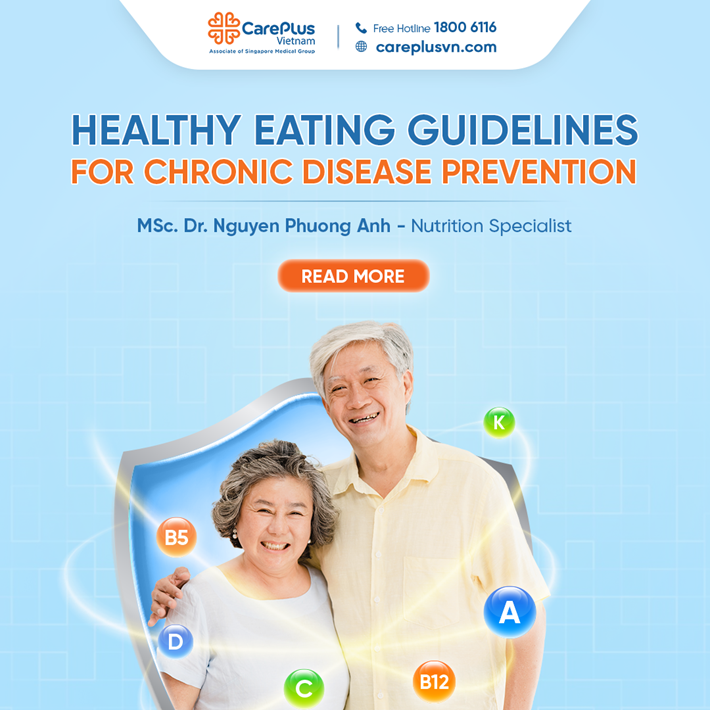PRINCIPLES OF A HEALTHY DIET TO PREVENT NON-COMMUNICABLE CHRONIC DISEASES
By embracing a balanced diet, proper nutrition, and appropriate physical activity, you're investing in your health to ensure a life full of well-being and happiness. Discover the expert-recommended principles of a healthy diet to prevent non-communicable chronic diseases from CarePlus.

8/30/2024 5:40:26 PM
🥗 Good nutrition is one of the key factors in building a healthy life. You can prevent and manage diseases, particularly non-communicable chronic diseases, by maintaining a balanced diet. MSc. Dr. Nguyen Phuong Anh, a Nutrition Specialist at CarePlus Clinic System, shares the principles of a healthy diet that help prevent diseases in the article below!
1/ What are Non-Communicable Chronic Diseases?
‼️ Non-communicable chronic diseases (NCDs) are illnesses that are not transmissible from person to person, as they do not originate from infections. These diseases develop gradually, persist over time, require long-term treatment, and pose significant consequences for both patients and society.
Chronic diseases encompass a wide range of conditions, but the four most notable ones are:
- Cardiovascular diseases (such as hypertension, heart attacks, and strokes);
- Cancer;
- Chronic respiratory diseases (such as chronic obstructive pulmonary disease and asthma);
- Diabetes.
2/ Are Non-Communicable Chronic Diseases Dangerous?
⛔ According to statistics from 2016, nearly 80% of deaths in Vietnam were caused by non-communicable chronic diseases. On average, Vietnam records around 12,500,000 cases of hypertension, 3,500,000 cases of diabetes, 2,000,000 cases of chronic heart and lung diseases, and nearly 126,000 new cancer cases annually.
3/ Nutritional Regimen to Prevent Non-Communicable Chronic Diseases
A proper and balanced diet can help strengthen the immune system, prevent and manage diabetes, cardiovascular diseases, and certain types of cancer.
✅ Depending on nutritional status, accompanying chronic diseases, or dietary habits, the nutritional regimen for individuals with non-communicable chronic diseases should be personalized. However, the following nutritional principles also play an important role in preventing and managing these diseases.
🔷 Sufficient Energy to Maintain a Healthy Weight
Both insufficient and excessive energy intake are risk factors for non-communicable chronic diseases. Therefore, the first principle of a diet is to ensure adequate energy to maintain a healthy weight.
An adult is considered to have a healthy weight when their Body Mass Index (BMI) ranges from 18.5 to 23 kg/m².
For example: A person weighing 56kg and standing 1.65m tall has a BMI of 20.5 kg/m², which falls within the healthy weight range for their height.
🔷 Balanced Food Groups
Each food group has its own nutritional value and cannot replace another. Therefore, every day, everyone needs to consume a variety of food groups, each in the recommended amount.
The food pyramid is built based on these food groups, with those at the base needing to be consumed more than those at the top.
🔷 Variety in Foods
Within each food group, diversify your food choices to receive a full spectrum of natural nutrients.
For example, in the grain group, we should eat a variety of foods like rice, potatoes, corn, bread, etc.
By eating well, balancing nutrition, and engaging in appropriate physical activity, you are investing in the health of yourself and your family, ensuring a healthier and happier life.
✅ These are the recommendations from CarePlus experts on a healthy diet that helps prevent and manage non-communicable chronic diseases.
If you or your loved ones are dealing with chronic diseases and want to improve your condition, don’t hesitate to contact CarePlus for personalized nutritional advice from our experienced and dedicated Nutritionists.
👉 Message us or book an appointment now via our toll-free hotline 1800 6116.
CAREPLUS INTERNATIONAL CLINICS
Associate of Singapore Medical Group
Hotline: 1800 6116
Email: info@careplusvn.com
Fanpage: CarePlus Clinic Vietnam